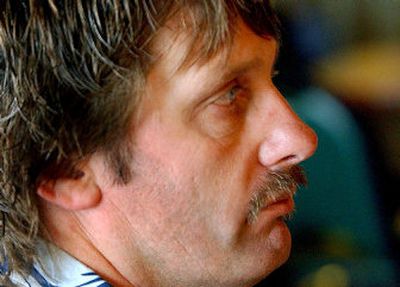Outreach program allows pastor to address real needs

“Have you had dinner? Can I make you a salad? A cup of tea?” Gar Mickelson, community outreach pastor at Hayden Lake Friends Church, opens his heart as easily as he opens his home. With Hoagy, his yellow Lab, curled up in front of the blazing fire, the scene resembles a Norman Rockwell illustration.
In 1988, having moved to Coeur d’Alene from Alaska, where he’d worked as a landscaper, Gar, along with his wife, Vicki, were establishing their own landscaping business, and were busy raising their son and daughter, when folks from the Friends Church reached out gently, inviting them to participate in basketball, Sunday school for their kids and small groups.
“That’s where the rubber hit the road for us,” says Gar Mickelson. “We started catching a vision of being part of church life.”
Things changed quickly and dramatically. Mickelson earned a ministry card, which enabled him to “marry and bury,” and was hired as youth pastor for the Hayden Lake congregation, in which capacity he served for 12 years. In 1995, in typical Quaker fashion, the family decided to give up the landscaping business and go into the ministry full time.
“We made the decision as a family right over there in the kitchen,” Mickelson says.
Friends, or Quakers, make all decisions by consensus. “We don’t vote on anything,” Mickelson says. “If we don’t have 100 percent consensus, we won’t move. We agree to disagree, and then we wait. The process takes longer, but everyone feels better.”
During his term as youth pastor, Mickelson started several programs that encouraged teenagers to find ways to serve the community. The Gus Bus, just one of these programs, regularly took teens from the church to low-income apartment complexes, where the youth group put on puppet shows, taught arts and crafts, fixed bicycles and served hot dogs to the children living there.
“The kids learned that serving is not just weeding and gardening and painting, but is sharing fun, things they have a passion for,” Mickelson says.
“I wanted to continue the premise of the youth ministry in my own life. All I wanted to do was outreach. So I resigned from the youth pastor position and almost immediately the church offered to create a position for me as community outreach pastor. I designed a program that was basically trailblazing: I go into the community and find out what the real needs are.”
Using statistics from the census bureau and local organizations, he discovered that in 2004 there were 3,600 people diagnosed as mentally ill in Kootenai County, 21 percent of whom were homeless. There were 15,000 people living in poverty, 4,000 of whom were children. Thirty-eight percent of school-age children qualified for free- or reduced-cost lunches. In 2004 there were 1,000 child-abuse referrals, and it’s estimated that 70 to 80 percent of child abuse cases go unreported. Four hundred children were placed in foster care, 700 in Region 1, the five northernmost counties of Idaho.
“Many of the negative effects of poverty for children result from the influence of economic stresses, including harsh and erratic patterns of parenting, the transitory nature of families, drugs,” says Mickelson. “Each time a kid moves, he or she loses four weeks of education. There’s a subculture of kids in trouble. The Kootenai County sheriff told me that 80 percent of all crimes are drug- or alcohol-related. The recidivism in our county is high compared to the rest of the state because we don’t have a good infrastructure for folks to get into housing.”
And so Twentyfour-Seven was born. Mickelson and his team of Friends have created a model program that helps people “create a life plan and see it through.”
Through a “wrap-around mentoring” plan, men and women in the program are surrounded by a team of volunteers who offer ongoing spiritual counseling, financial advice and assistance, parenting help, employment and friendship.
“In the past, the church had a sort of castle mentality: ‘If you can get to us, we’ll lower the drawbridge, and once you get here, we’ll take care of you.’ But this feels different … we go to them.”
Twentyfour-Seven is currently operating House of Hope, a home for women just out of prison, and Harvest House, which will eventually be a transitional home for men. The wrap-around mentoring model is “having an effect on people two or four at a time,” says Mickelson.
In a climate of confusion over the division of church and state, Twentyfour-Seven is providing a bridge. The Idaho Department of Health and Welfare has invited this faith-based group to become providers of transitional housing. They are in compliance with all city ordinances and are being used as a model program by the Department of Corrections and Probation and Parole.
Twentyfour-Seven, “from this small potatoes church in North Idaho,” says Mickelson, “is one of the first faith-based organizations to qualify as a provider. We try to show our clients grace and love, and we require accountability. We play hardball when we need to, but in a loving manner.”
Mickelson continues, “More important than political activism is social activism. It makes us better people. We focus on others, and somewhere in the process we get healed.”